Chinese residential housing prices are increasing rapidly, which according to Bloomberg China, is related to a lack of confidence in other forms of business investments. The stock market is underdeveloped and stagnant; the bond market is in it’s infancy; and the return on bank deposits is only marginally outpacing inflation. In the wake of this bleak investment environment, the Chinese are turning to the housing market, which is experiencing strong growth: “New home prices in major cities, including Beijing and Shanghai, rose more than 10 percent in July from a year earlier”
There is a belief among China’s wealthy investors that a real estate bubble is developing in china. Although housing prices in china are indeed rising rapidly, for a housing bubble to exist, the prices must be rising to unsustainable levels. Rapid increases in housing prices, by themselves do not necessarily mean that a housing bubble is developing. There is a very real possibility that the housing market is properly adjusting to a shift in demand for housing within china. We know that since 2000, china’s population has increased from 1,262,645,000 to 1,350,695,000 in 2012. That’s an increase of 88,050,000 people, which is more than the population of all but 13 countries in the entire world. China’s increase in population over the last 10 years would be more people than live in 229 of the 242 countries reporting population in a simple Wikipedia search; all of those people need somewhere to stay.
In addition to the rapid population growth, china is experiencing significant economic growth overall and on a per-capita basis, and there are indications that the growth is real and being distributed across the income spectrum. The WorldBank’s measure of population distribution shows a fairly constant share of China’s income going to the to fifth of earners in china over the last 25 years or so. There is some amount of equal distribution of wealth in china and there is much more wealth to go around. The gross national income of china per-capita increased from $3180 in 2003 to $9060 in 2012. This doesn’t account for inflation, but the story of rapid growth, spread among china’s 1.3 billion people is still evident. With the addition of so many heads needing a roof and the increasing wealth of china’s citizens, the country could be experiencing a legitimate shift in demand that is raising prices rapidly, but not necessarily artificially.


The fundamentals of the Chinese housing market is a hotly disputed topic. With many parties convinced of the clear signs of a real-estate bubble forming and others pointing to material drivers of growth. Reed highlights three important components of the Chinese economy that indicate that real-estate should, in fact, be realizing robust growth. The first being the lack of alternative, secure investments. Financial markets are still being established in China. Domestic and foreigners do not trade the same class of shares, the bond market is relatively nascent, and the government maintains comparatively tight controls on its financial sector. The lack of clear substitutes for investments, especially if the real return on savings is marginal, fosters an incentive for the Chinese household to invest in housing, allocating a large share of their net worth to real-estate. Secondly, the sheer magnitude of the population growth innately drives demand for housing. Coupled with rapidly rising per capita income, exceptional price appreciation in the real-estate market is to be expected.
Another point that contributes to the fundamentals of the Chinese housing market, peculiar to China, is the hypergamous Chinese culture that was discussed in class. The piece discussed in class attributes 48% of the rise in housing prices (2003-2009) in China to the importance of young men acquiring a home for marriage. This symbol of status would then attract a women ready to begin a family. Essentially, there are many key drivers of the housing market that support real demand for real-estate, justifying the robust appreciation.
The lack of alternatives is a classic bubble story: yes, prices are crazy, but we at least provide a positive return. A little rise in interest rates and … pop!
Then we need to ask about rent vs purchase price. If you are buying as your dream house then you may not care, but otherwise you have to compare it to alternatives.
In addition, what of occupancy rates, and monthly carrying cost relative to income (in terms of foregone earnings – but here we’ve potentially circular reasoning, if financial markets are not “deep” so that few options are available)?
The one upside is that with ongoing urbanization, a crash would potentially lead to all those unoccupied condos and apartments being brought on the market for rental and occupancy. That ties in with our next module on migration.
It is interesting how Chinese expectations of “home life” have changed. In the past(on the farm) families lived with 3 or 4 generations of family. Until the late 1980s families generally only had 1 floor houses in the countryside. As families flock into the cities which are already overcrowded it only makes sense that housing prices would rise due to demand. For many new families moving to the city and renting financially might be more plausible than buying an apartment. As seen in the factory pictures the apartments all look alike and are tiny but made just like the toys. All the same and mass produced.